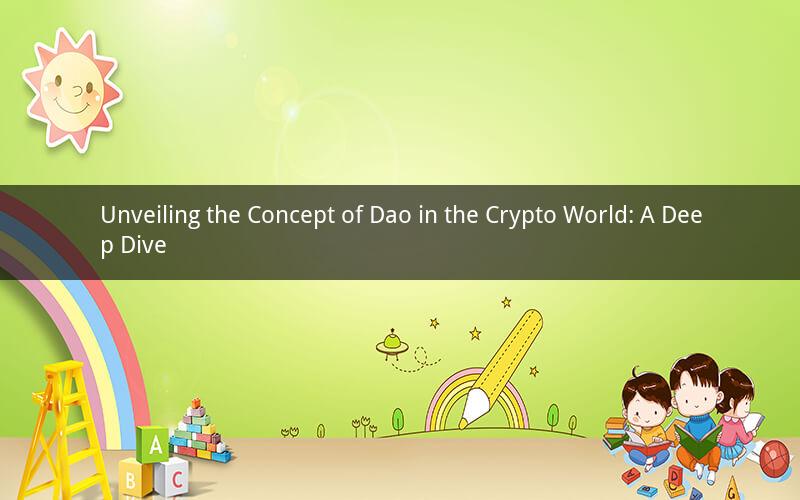
Introduction:
The term "Dao" has become increasingly popular in the crypto world, yet many people still find it challenging to understand its true meaning and significance. In this article, we will explore the concept of Dao, its origin, its role in the crypto industry, and its potential impact on the future.
1. What is Dao?
Dao, short for Decentralized Autonomous Organization, is a revolutionary concept that emerged in the crypto community. It is an organization that operates without traditional management structures, with decision-making power distributed among its members. Instead of centralized leadership, Dao relies on smart contracts, blockchain technology, and a community-driven approach to manage its operations.
2. The Origin of Dao
The idea of Dao was first introduced by Ethereum co-founder Vitalik Buterin in 2016. He envisioned a new form of organization that would utilize blockchain technology to enable decentralized, transparent, and democratized decision-making. Since then, the concept of Dao has gained traction in the crypto industry, with several notable examples emerging.
3. How Does Dao Work?
Dao operates on a decentralized network, primarily through smart contracts, which are self-executing contracts with the terms of the agreement directly written into lines of code. These smart contracts are transparent and immutable, ensuring that all participants can view and verify the terms and conditions of the agreement.
In a Dao, members are typically represented by tokens, which give them voting rights and influence over the organization's decisions. By holding tokens, individuals can participate in governance, propose changes, and vote on various initiatives. The collective intelligence of the community drives the organization's direction, eliminating the need for a central authority.
4. Role of Dao in the Crypto Industry
Dao has become a pivotal force in the crypto industry, offering numerous benefits over traditional organizational structures. Some of the key roles of Dao include:
- Innovation: Dao allows for the creation of innovative projects without the need for a centralized entity. By leveraging the collective intelligence of the community, Dao can rapidly iterate and adapt to market changes.
- Transparency: As all transactions and decisions are recorded on the blockchain, Dao operates with a high level of transparency. This fosters trust among participants and enhances the credibility of the organization.
- Accessibility: Dao removes geographical and social barriers to participation. Individuals from diverse backgrounds can join the community, contribute to the project, and share in its success.
5. Potential Impact of Dao on the Future
Dao has the potential to disrupt various industries beyond the crypto space. Here are some possible impacts:
- Business Models: Dao could revolutionize traditional business models by eliminating the need for centralized leadership and fostering a more democratic approach to decision-making.
- Governance: Dao could serve as a model for more transparent and participatory governance systems, both within and outside the crypto industry.
- Innovation: Dao's community-driven nature could lead to faster innovation and the development of groundbreaking technologies.
- Education: Dao could become a valuable educational tool, helping individuals learn about blockchain technology, smart contracts, and decentralized governance.
FAQs:
Q1: What are the advantages of joining a Dao?
A1: Joining a Dao offers numerous benefits, including the opportunity to participate in decision-making, share in the organization's success, and contribute to innovative projects.
Q2: Can Dao be used for any type of project?
A2: Yes, Dao can be applied to a wide range of projects, from decentralized finance (DeFi) to decentralized applications (DApps) and beyond. Its versatility makes it a compelling choice for organizations seeking a decentralized and transparent approach.
Q3: Is it necessary to be a blockchain expert to join a Dao?
A3: No, it is not necessary to have extensive blockchain knowledge to join a Dao. While technical expertise can be helpful, many Daos welcome individuals with diverse backgrounds who are interested in contributing to the organization's goals.
Q4: Can a Dao function without tokens?
A4: While tokens are a common feature of DApps and DApps, a Dao can operate without them. The organization can use alternative mechanisms, such as reputation systems or direct participation, to govern and manage its operations.
Q5: What are the challenges of implementing a Dao?
A5: Implementing a Dao presents several challenges, including ensuring a high level of security, managing the participation of diverse individuals, and addressing potential conflicts of interest. Despite these challenges, the potential benefits of Dao make it a compelling concept for the future of decentralized organizations.